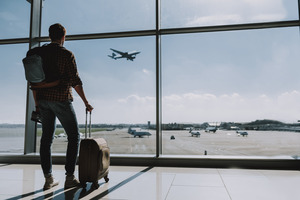Tips for Flying after a Tooth Extraction
September 13, 2024

Flying after a tooth extraction is a concern for many patients, especially when it comes to managing discomfort and preventing complications. While it’s possible to travel by air after the procedure, there are a few factors to consider for a smooth and safe experience. Below, we’ll cover how altitude affects healing, timing your flight, and tips for managing discomfort.
Altitude and Pressure Changes
One of the primary concerns with flying after a tooth extraction is the pressure changes that occur in the cabin. As the airplane ascends, air pressure decreases, which can cause discomfort in the mouth, especially if there is swelling or a blood clot forming at the extraction site. Pain can also arise from sinus pressure changes, particularly for upper teeth near the sinus cavities. To minimize discomfort, over-the-counter pain medications and a cold compress can help manage swelling and pressure.
Timing Your Flight
The ideal time to fly after a tooth extraction depends on the complexity of the procedure and your healing process. For simple extractions, it’s usually safe to fly within 24 to 48 hours if there are no complications. However, for more involved procedures like wisdom tooth extractions or surgical removals, we generally recommend waiting at least a week. This delay helps ensure that the blood clot has stabilized, reducing the risk of dry socket and other complications caused by pressure changes during the flight
Tips for Managing Discomfort
If you need to fly soon after your extraction, there are a few tips that can help manage discomfort. First, stay hydrated to help your body recover and prevent your mouth from drying out, which can cause irritation. You can also chew gum or suck on candy during takeoff and landing to help equalize pressure in your ears and sinuses, which might reduce pain. Carry your prescribed pain medications with you in case you experience discomfort during the flight. Lastly, avoid hard, crunchy foods and stick to soft, cold meals to prevent irritation to the extraction site.
About the Author
Dr. Eric Barajas’ favorite thing about being a dentist for over 30 years has been watching his patients grow and change alongside his practice. That’s part of why he’s so dedicated to exceptional dental care—he wants his patients to keep coming back to him for as long as possible! Dr. Barajas received his dental degree from the UCLA School of Dentistry, and in the interest of staying up-to-date with the latest in his field, he regularly attends continuing education courses.
If you have any questions about flying after a tooth extraction, he can be reached at our website or by phone at (619) 482-7367.
No Comments
No comments yet.
RSS feed for comments on this post.
Sorry, the comment form is closed at this time.
